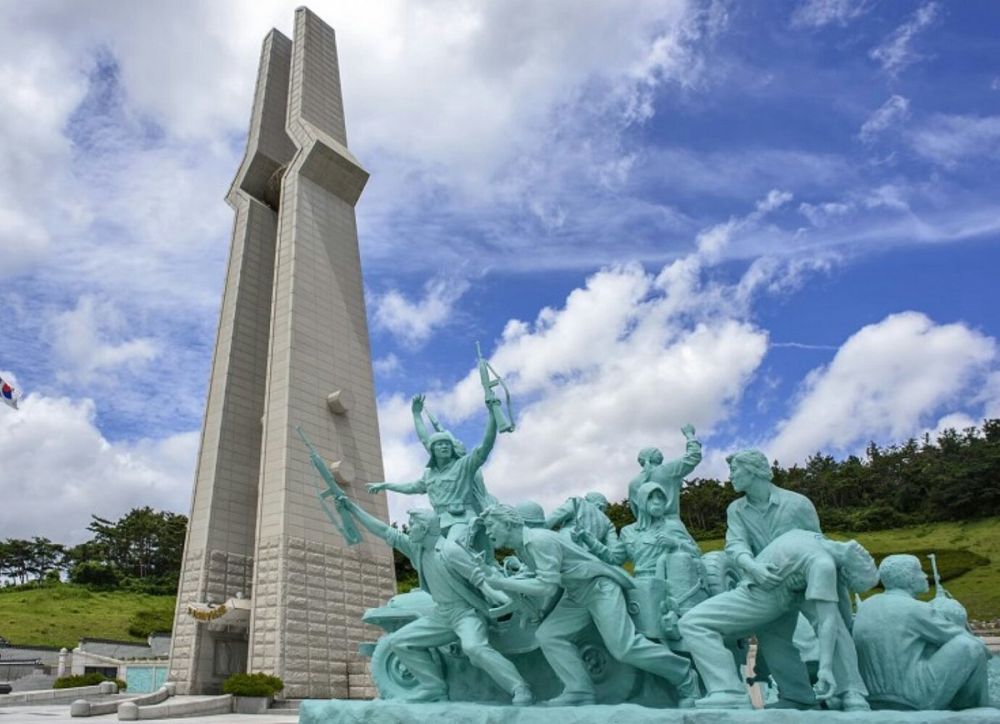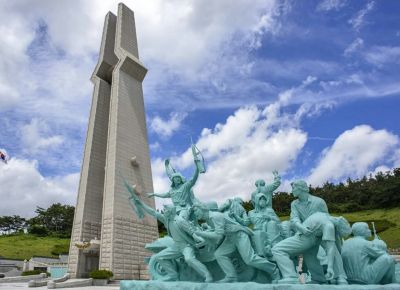

Explore the poignant history of the Gwangju Uprising as you walk through the solemn grounds of the May 18th National Cemetery. Join a knowledgeable guide who will provide an in-depth commentary on the events of May 1980, which led to the establishment of this memorial site. As you pass by rows of graves, monuments, and memorials, you'll hear stories of the victims and heroes who fought for democracy in South Korea. This tour is not only a journey through the country’s turbulent history but also an opportunity to pay respect to those who sacrificed their lives for the nation's liberty. The guide will also direct your attention to the symbolic design elements throughout the cemetery that commemorate the spirit of the uprising, the hope for peace, and the ongoing commitment to human rights.
Photography enthusiasts and history buffs can combine their passions during this interpretive photo walk. Capture the serene beauty and significance of the May 18th National Cemetery with your camera as a professional photographer leads you to visually impactful spots within the site. Learn to frame compelling photographs that communicate the solemnity and the historical weight of the cemetery. Participants will be coached on both technical and artistic aspects of photography, ensuring they leave with stunning images and a deeper understanding of the events commemorated here. Suitable for all levels of photography skills, the focus is on connecting with the site's history and transforming those feelings into evocative visual narratives.
This activity is tailored towards students and individuals interested in expanding their knowledge of the Gwangju Uprising's influence on South Korea's democracy. The program includes documentary screenings, interactive workshops, and discussions led by historians and educators specializing in modern Korean history. Participants will delve into the catalysts of the uprising, its aftermath, and its lasting impact on political reformation. The program aims to foster critical thinking and offers a deeper insight into the May 18th democratic movement while encouraging attendees to reflect on the values of human rights and freedom. This is an exceptional educational opportunity to learn about a pivotal period in South Korea's path to democracy directly from experts in the field.
Each year, visitors can join a twilight candlelight memorial service, which pays homage to the lives lost during the May 1980 Gwangju Democratisation Movement. As dusk falls, participants gather to light candles and observe a moment of silence in a powerful act of remembrance and solidarity. The tradition of lighting candles is deeply symbolic in Korean culture, reflecting hope and the enduring quest for justice. This solemn event allows individuals to connect emotionally with the sacrifices made for democracy and to honor the memory of the fallen. The atmosphere during the service is one of contemplation, community, and the shared pursuit of peace.
For those seeking a moment of peace and introspection, the May 18th National Cemetery offers meditation sessions in the tranquil surroundings. Led by experienced practitioners, these sessions provide guidance on mindfulness and reflect on the principles of peace and reconciliation that the cemetery stands for. The setting offers a unique atmosphere for contemplation, where visitors can sit in quiet reflection amidst history, honoring those who fought for democracy while also finding personal solace. The meditation sessions are open to people of all beliefs and are intended to provide a moment of calm reflection within the quiet and respectful environs of the cemetery.
Activists, students, and anyone interested in learning about human rights and democratic values are invited to take part in an interactive workshop held at the May 18th National Cemetery. The workshop focuses on the historical significance of the Gwangju Uprising and its impact on the human rights movement in Korea and around the world. Through a series of seminars, discussions, and group activities, participants will gain insights into the struggle for democracy and the ongoing efforts to protect human rights globally. The experience is designed to be educational, empowering, and inspiring, challenging individuals to consider their role in the fight for freedom and justice in society.
This art class invites individuals to express their responses to the May 18th democratic movement through various forms of artistic media. Under the guidance of a local artist, participants will create art pieces that are inspired by the stories and symbolism of the uprising. Whether it's through painting, drawing, or sculpture, the class provides a therapeutic outlet for creative expression. This activity is also an opportunity to further educate attendees about the significant role that art played in documenting and spreading the message of the May 18th movement. No art experience is necessary, as the focus is on personal expression and the communal act of remembrance.
Every year, a remembrance concert is held at the May 18th National Cemetery to honor the memory of those who gave their lives during the uprising. The concert features live performances by local musicians and choirs, who perform both traditional Korean music and contemporary pieces that resonate with the themes of hope, courage, and remembrance. The concert provides an avenue for collective mourning and celebration of the spirit of the May 18 movement. Attendees are invited to join in the music-filled commemoration, a powerful reminder of the role the arts play in uniting people and expressing shared values and histories.
Step back in time with this guided walk around the May 18th National Cemetery, emphasizing the cultural and heritage aspects of the site. The tour will explore the unique architectural and landscape features that reflect the history and memory of the 1980 uprising. A cultural historian will provide insights into how the design elements of the cemetery preserve the legacy of the movement and serve as a place of education for future generations. With a focus on cultural preservation, the tour will stimulate thoughtful discussion about the role of national memorials in maintaining collective memory and cultural identity.
Attendees have the rare opportunity to hear firsthand accounts from individuals who witnessed and participated in the May 18th Democratic Uprising. This storytelling session allows veterans of the movement to share their personal stories, struggles, and reflections. Through these narratives, participants will gain an intimate perspective on the human experiences behind the historical event. These sessions are designed to foster understanding and personal connection to the past, ensuring that the lessons and spirit of the uprising are not forgotten. The storytelling is followed by a Q&A, where attendees can engage directly with the veterans and deepen their understanding of the movement's significance.
